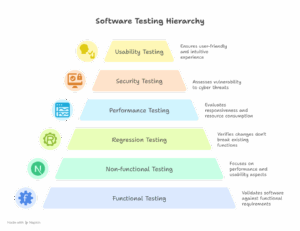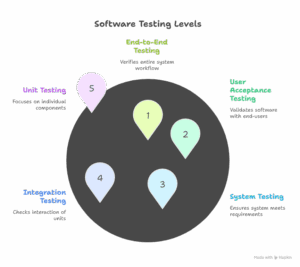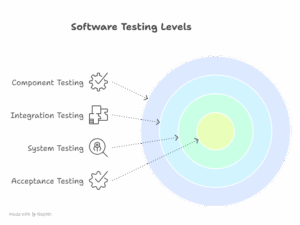It’s the cornerstone that guarantees the reliability, security, and user-friendliness of every application and system we interact with daily. This profession demands a comprehensive understanding of diverse methodologies, the latest tools, and best practices. If you’re looking to build a robust career in this in-demand field, a specialized software testing online training program is your gateway. Let’s delve into the crucial aspects of software testing and how Elysium Academy software testing online training can equip you for success.
The Landscape of Software Testing: Essential Categories and Approaches
Software testing isn’t a single, monolithic activity; it’s a multi-faceted discipline categorized based on its objectives, the approach taken, and its scope within the development lifecycle. Understanding these distinctions is fundamental for anyone pursuing software testing online training. Each category targets specific aspects, ensuring a holistic evaluation of the software product.
Based on Testing Objectives
These classifications highlight what the testing aims to achieve, whether it’s verifying functionalities or assessing performance and security. At Elysium Academy, your software testing online training will cover all these critical areas.
Functional Testing
This type of testing is about validating the software against its specified functional requirements. It ensures that every feature and function performs exactly as intended, from user logins to data processing. If you’re considering software testing online training, grasping functional testing is paramount as it forms the base of quality assurance. It confirms that the software behaves correctly according to the user’s expectations. Through software testing online training, you’ll learn to craft scenarios that rigorously check each function.
Non-functional Testing
Beyond what the software does, non-functional testing focuses on how well it performs. This includes aspects like speed, scalability, reliability, and usability. It’s crucial for understanding the software’s resilience and efficiency. A comprehensive software testing online training program emphasizes non-functional testing to mitigate risks associated with system bottlenecks or user dissatisfaction. This ensures your software testing online training provides a holistic view.

Regression Testing
Whenever changes, updates, or bug fixes are introduced into the software, regression testing becomes essential. It verifies that these new modifications haven’t inadvertently broken existing functionalities. This iterative process is a core component of continuous quality assurance. Expertise in regression testing, often acquired through dedicated software testing online training, is key to maintaining software integrity over time, ensuring new features don’t introduce old problems. Every module in your software testing online training will underscore its importance.
Performance Testing
This specifically evaluates the software’s responsiveness, stability, and resource consumption under various workloads. It ensures the application can handle anticipated user loads without slowing down or crashing. For professionals undergoing software testing online training, understanding performance metrics and tools is vital for building robust, high-performing systems. This segment of software testing online training often includes load, stress, and scalability testing.
Security Testing
In an age of escalating cyber threats, security testing is non-negotiable. It assesses the software’s vulnerability to unauthorized access, data breaches, and other malicious activities. Ensuring the software protects sensitive information and adheres to security standards is a critical skill for anyone completing software testing online training. This module of software testing online training is particularly relevant in today’s digital world.
Usability Testing
This category focuses on the user experience – how easy and intuitive the software is to use. It involves evaluating the user interface, navigation, and overall user journey to ensure it meets the needs and expectations of the target audience. High-quality software testing online training includes hands-on practice in conducting usability tests to deliver user-friendly products. Elysium Academy software testing online training makes this a priority.
Based on the Testing Approach
The approach taken determines whether the testing focuses on the external behavior or internal structure of the software. Your software testing online training at Elysium Academy will cover these distinct methodologies.
Black Box Testing
This method evaluates the software’s functionality without any knowledge of its internal code structure or design. Testers interact with the software purely from an end-user perspective, providing inputs and observing outputs. This can encompass both functional (e.g., system testing, user acceptance testing) and non-functional aspects (e.g., usability, performance). Our software testing online training provides extensive modules on this. Software testing online training emphasizes applying black box techniques to real-world scenarios.
White Box Testing
In contrast to black box testing, white box testing (also known as clear box or structural testing) involves examining the internal structure, code, and design of the software. Testers use their understanding of the code to design test cases that cover internal paths, validate logic, and identify vulnerabilities. This is a crucial skill gained through advanced software testing online training, ensuring thorough code quality. Your software testing online training will delve deep into code coverage techniques here.
Grey Box Testing
Bridging the gap between black box and white box testing, grey box testing involves testing the software with a limited understanding of its internal workings. Testers might have access to design documents, database schemas, or API specifications, allowing for more informed test case design than pure black box, but without full code access like white box. This pragmatic approach is increasingly relevant, and a good software testing online training program will explore its applications. It offers a balanced perspective, a key takeaway from software testing online training.
Based on Testing Scope

The scope defines which part or level of the software system is being tested. Mastering these levels is fundamental for anyone undergoing comprehensive software testing online training.
Unit Testing
This is the lowest level of testing, focusing on individual components or “units” of the software in isolation. Developers typically perform unit tests to ensure that each small piece of code functions correctly before integration. It’s a foundational skill taught early in any software testing online training program, catching bugs at their source. During your software testing online training, you’ll practice writing unit tests.
Integration Testing
Once individual units are tested, integration testing verifies how these units interact and communicate with each other. It uncovers issues that arise when different modules are combined, such as interface errors or data flow problems. This is a critical step in the development lifecycle, and a significant part of your software testing online training will be dedicated to integration strategies. Proper software testing online training will cover various integration techniques.
System Testing
At this level, the entire, integrated software system is tested to ensure it meets all specified functional and non-functional requirements. It’s a comprehensive test of the complete product, verifying that all components work together seamlessly to deliver the intended results. This often simulates real-world usage scenarios. Your software testing online training will prepare you for these complex full-system evaluations.
User Acceptance Testing (UAT)
UAT is the final stage of testing before deployment, conducted by actual end-users or clients. Its purpose is to confirm that the software satisfies their needs and expectations in a real-world environment. It’s about validating that the product is “fit for purpose” and meets business requirements. Effective software testing online training includes modules on how to facilitate and interpret UAT results. This is a capstone skill learned in software testing online training.
End-to-End Testing
This type of testing verifies the entire software system’s workflow from start to finish, including all integrated components, databases, APIs, and external dependencies. It ensures that the complete system functions correctly throughout a typical user journey. This provides a holistic view of the system’s performance and functionality under real-world conditions, a crucial aspect covered in advanced software testing online training.
Based on Testing Techniques
These classifications distinguish how the tests are executed, whether manually, through automation, or by static analysis. Elysium Academy software testing online training provides expertise in all these techniques.
Manual Testing
As the name suggests, manual testing involves a human tester manually executing test cases without the aid of automated tools. The tester meticulously interacts with the software, observes its behavior, and compares actual results against expected outcomes to identify defects. While time-consuming for large projects, it’s invaluable for exploratory testing and usability assessments. Your initial software testing online training will likely involve manual testing exercises.
Automated Testing
Automated testing leverages specialized tools and scripts to execute predefined test cases automatically. This significantly increases efficiency, reduces testing time, and enhances test coverage, especially for repetitive tasks and regression testing. A strong software testing online training program will extensively cover automation frameworks and tools, preparing you for modern QA roles. This is a cornerstone of modern software testing online training.
Static Testing
Unlike other forms of testing that involve running the software, static testing analyzes code, design documents, and requirements without actual execution. Techniques include code reviews, walkthroughs, and inspections, aiming to identify defects early in the development cycle, reducing the cost of fixing them later. This proactive approach is a key part of thorough software testing online training. It’s about preventing bugs, a concept reinforced throughout software testing online training.
Based on Testing Levels (Often Overlapping with Scope)
These categories often overlap with the ‘Based on Testing Scope’ section but are sometimes viewed as a separate hierarchy within the testing process. Your software testing online training will make these distinctions clear.

Component Testing
Similar to unit testing, component testing focuses on individual, self-contained components or modules of the software. It verifies the functionality, performance, and security of each component in isolation, ensuring it performs its intended function correctly. This is a granular level of validation, taught comprehensively in software testing online training.
Integration Testing
This level assesses the interactions between different software components or modules. It’s about confirming that the interfaces and data flows between integrated parts work as expected, uncovering issues that emerge only when components are combined. This is a vital bridge from individual units to a complete system, a significant focus in software testing online training.
System Testing
This evaluates the entire, complete software system as a whole. It encompasses testing the integration of various components and sub-systems, validating overall system requirements, and confirming the total functionality, performance, and security of the application. It’s a macro-level check before deployment, thoroughly covered in software testing online training.
Acceptance Testing
This confirms that the software satisfies the defined business requirements and user needs. It often involves testing the application in a simulated real-world environment with actual data to ensure it is fully functional and easy to use. It’s the ultimate validation point before the software is released to the public, a critical skill refined through software testing online training.
Why Pursue Software Testing Online Training? The Advantages
Investing in software testing offers a multitude of benefits, not just for individuals seeking a career but also for the overall success of software projects. Elysium Academy software testing focuses on delivering these advantages.
Ensured Quality and Reliability:
The primary goal of software testing is to ensure the product delivered to end-users is of the highest quality. By rigorously testing performance, functionality, and user experience, a product’s reliability is significantly enhanced. Your software testing at Elysium Academy will instill a quality-first mindset. This is a core pillar of software testing .
Enhanced Security:
Robust testing practices identify and mitigate potential security vulnerabilities, protecting user data and intellectual property from breaches and cyber threats. This is especially crucial in today’s interconnected world. Security testing is a dedicated and vital part of any comprehensive software testing online training.
Higher Customer Satisfaction:
Delivering bug-free, intuitive, and high-performing software directly translates to happier users. Satisfied customers are more likely to adopt the software, provide positive feedback, and recommend it to others, building brand loyalty. The principles taught in software testing contribute directly to this.
Reduced Risk of Failures and Downtime:
Proactive testing helps identify and address potential failure points before the software goes live. This minimizes the risk of costly downtime, operational disruptions, and reputational damage. Comprehensive testing online prepares you to identify these risks early.
Significant Cost Savings:
Discovering and fixing bugs during the early stages of the software development life cycle is significantly cheaper than fixing them after deployment. Testing helps catch defects when they are easiest and most economical to rectify, saving businesses substantial resources. This economic benefit is a strong case for investing in software .
Improved Efficiency and Performance:
Through performance testing and optimization, software can be fine-tuned to operate more efficiently, respond faster, and handle greater loads. This leads to a smoother user experience and better resource utilization. Learning these techniques is a key outcome of software testing online training.
Better Brand Reputation:
A company that consistently delivers high-quality, reliable, and secure software builds a strong reputation in the market. This reputation attracts more customers and talent, fostering growth and trust. Your expertise from software will be directly instrumental in this.
Compliance and Regulatory Adherence:
Many industries have strict regulatory standards (e.g., healthcare, finance). Software testing ensures that applications comply with these legal and industry-specific requirements, avoiding penalties and legal issues. Understanding compliance is a part of advanced software training.
The Future of Software Testing and Your Career with Elysium Academy Software Testing Online Training
The software industry is constantly evolving, and so is the demand for skilled software testers. New technologies like Artificial Intelligence (AI) and Machine Learning (ML) are not replacing testers but rather creating new avenues for applying testing skills in innovative ways, such as AI-driven test automation and predictive analytics for bug detection. The widespread adoption of Agile and DevOps methodologies is also transforming software testing into a more integrated, continuous, and collaborative process, shifting from traditional, siloed QA teams to “Quality Engineering” roles embedded within development teams.
To thrive in this dynamic landscape, aspiring professionals need more than just theoretical knowledge; they need practical skills, industry exposure, and career guidance. This is precisely what software testing online training from Elysium Academy offers. Our program is designed to equip you with the necessary expertise in both manual and automated testing, performance analysis, security fundamentals, and the latest testing frameworks. With a focus on hands-on projects and real-world case studies, our online training ensures you are job-ready from day one. Many of our students benefit from software testing with placement assistance, providing a direct pathway to exciting career opportunities in this in-demand field.
By choosing Elysium Academy for your training, you’re not just enrolling in a course; you’re investing in a future-proof career, gaining the skills to become an indispensable asset in any software development team. Your journey to mastering quality and ensuring seamless digital experiences starts here with comprehensive software testing
FAQs about Software Testing and Online Training
-
What are the primary types of software testing?
There are numerous types, but some main categories include functional testing, non-functional testing, black-box testing, white-box testing, unit testing, integration testing, system testing, user acceptance testing, manual testing, and automated testing. Each aspect of these is covered thoroughly in our software testing online training.
2 How many main categories of software testing exist?
While approaches vary, software testing is broadly categorized into two main types based on what’s being tested: Functional Testing (what the system does) and Non-functional Testing (how well the system performs). Our software testing online training dives deep into both.
3. Can I learn software testing effectively through online training?
Absolutely! Modern software testing online training programs, like those at Elysium Academy, are designed to be highly interactive, offering virtual labs, live instructor sessions, project-based learning, and dedicated support, making them as effective as, if not more convenient than, traditional classroom settings. Software testing online training provides flexibility.
4. What are the key skills I’ll gain from software testing online training?
You’ll develop skills in test case design, defect management, various testing methodologies (manual, automation, performance, security), understanding SDLC and STLC, using testing tools (e.g., Selenium, JMeter, Jira), and analytical problem-solving. These are all critical outcomes of our software testing online training.
5. What kind of career opportunities are available after completing software testing online training?
Graduates can pursue roles such as QA Engineer, Test Engineer, Software Tester, Automation Test Engineer, Performance Tester, Security Tester, QA Analyst, and more. The demand for skilled professionals with software testing online training is consistently high across various industries.
Conclusion
The demand for skilled software testing professionals is consistently high, driven by evolving technologies and agile methodologies. By investing in comprehensive software testing online training, you equip yourself with the critical expertise to identify defects early, enhance product reliability, save costs, and ultimately contribute to exceptional customer satisfaction.

















